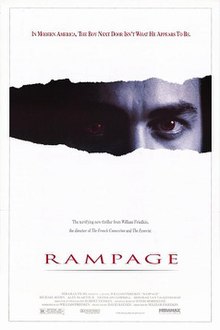Rampage (1987 film)
- For the 1963 adventure film starring Robert Mitchum, see Rampage.
| Rampage | |
|---|---|
 Promotional poster | |
| Directed by | William Friedkin |
| Screenplay by | William Friedkin |
| Produced by | William Friedkin David Salven |
| Starring | |
| Cinematography | Robert D. Yeoman |
| Edited by | Jere Huggins |
| Music by | Ennio Morricone |
Production company | |
| Distributed by | Metropolitan Filmexport (France) Miramax Films (USA & Canada) |
Release dates |
|
Running time | 97 minutes |
| Country | United States |
| Language | English |
| Budget | $7.5 million |
| Box office | $796,368[1] |
Rampage is a 1987 American crime drama film written, produced and directed by William Friedkin. The film stars Michael Biehn, Alex McArthur, and Nicholas Campbell.
In restrospect William Friedkin said: "There are a lot of people who love Rampage, but I don’t think I hit my own mark with that"[2]
Plot
Charles Reece is a serial killer who commits a number of brutal mutilation-slayings in order to drink blood as a result of paranoid delusions.
Reece is soon captured. Most of the film revolves around the trial and the prosecutor's attempts to have Reece found sane and given the death penalty. Defense lawyers, meanwhile, argue that the defendant is not guilty by reason of insanity.
The prosecutor, Anthony Fraser, was previously against capital punishment, but he seeks such a penalty in the face of Reece's brutal crimes after meeting one victim's grieving family.
In the end, Reece is found sane and given the death penalty, but Fraser's internal debate about capital punishment is rendered academic when Reece is found to be insane by a scanning of his brain for mental illness. In the ending of the original version of the film, Reece is found dead in his cell, having overdosed himself on antipsychotics he had been stockpiling. In the ending of the revised version, Reece is sent to a state mental hospital, and in a chilling coda, he sends a letter to a person whose wife and child he has killed, asking the man to come and visit him. A final title card reveals that Reece is scheduled for a parole hearing in six months.
Cast
- Michael Biehn as Anthony Fraser
- Alex McArthur as Charles "Charlie" Reece
- Nicholas Campbell as Albert Morse
- Deborah Van Valkenburgh as Kate Fraser
- John Harkins as Dr. Keddie
- Art LaFleur as Mel Sanderson
- Billy Greenbush as Judge McKinsey
- Royce D. Applegate as Gene Tippetts
- Grace Zabriskie as Naomi Reece
- Carlos Palomino as Nestode
- Roy London as Dr. Paul Rudin
- Donald Hotton as Dr. Leon Gables
- Andy Romano as Spencer Whaley
- Patrick Cronin as Harry Bellenger
- Whitby Hertford as Andrew Tippetts
- Brenda Lilly as Eileen Tippetts
- Roger Nolan as Dr. Roy Blair
- Rosalyn Marshall as Sally Ann
- Joseph Whipp as Dr. George Mahon
- Angelo Vitale as Assit. D. A.
Influences
Charles Reece is loosely based on serial killer Richard Chase.[3] The crimes that Reece commits are slightly different from Chase's, however; Reece kills three women, a man and a young boy, whereas Chase killed two men, two women (one of whom was pregnant), a young boy and a 22-month-old baby. Additionally, Reece escapes at one point - which Chase did not do - murdering two guards and later a priest. However, Reece and Chase similarly had a history of mental illness and an obsession with drinking blood. Unlike Reece, Chase was sentenced to death, but he was found dead in his prison cell, an apparent suicide, before the sentence could be carried out.[4][5]
Soundtrack
The film's score was composed by Ennio Morricone and was released on CD by Virgin Records.
Release
Rampage was originally shot in 1986 in Stockton, California; it played at the Boston Film Festival in September 1987, and ran theatrically in some European countries in the late 1980s. Plans for the film's theatrical release in America were shelved when production studio DEG, the distributor of Rampage, went bankrupt. The film was unreleased in North America for five years. Director Friedkin reedited the film, and changed the ending (with Reece no longer committing suicide in jail) before its US release in October 1992.[6] The European video versions usually feature the film's original ending. In his review, film critic Roger Ebert gave Rampage three stars out of four saying, "This is not a movie about murder so much as a movie about insanity - as it applies to murder in modern American criminal courts...Friedkin['s] message is clear: Those who commit heinous crimes should pay for them, sane or insane. You kill somebody, you fry - unless the verdict is murky or there were extenuating circumstances." [7]
Home media
As of 2010, the film has been released on DVD only in Poland, by SPI International.
References
- ^ Rampage at Box Office Mojo
- ^ http://www.vulture.com/2013/05/william-friedkin-interview.html
- ^ The Vampire of Sacramento Richard Trenton Chase
- ^ https://web.archive.org/web/20090228111245/http://www.trutv.com/library/crime/serial_killers/weird/chase/demise_8.html
- ^ Friedkin p 396-401
- ^ Friedkin p 400-401
- ^ Ebert, Roger (October 30, 1992). "Rampage". Retrieved July 28, 2017.
- Friedkin, William, The Friedkin Connection, Harper Collins 2013
External links
- Rampage at IMDb
- Rampage at Rotten Tomatoes
- Rampage at Box Office Mojo
- 1987 films
- 1980s crime drama films
- 1980s thriller films
- American films
- American crime drama films
- American crime thriller films
- English-language films
- Films directed by William Friedkin
- Cannibalism in fiction
- Films based on American novels
- American films based on plays
- Films shot in California
- American independent films
- Mental illness in fiction
- Serial killer films
- Films scored by Ennio Morricone
- De Laurentiis Entertainment Group films
